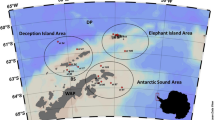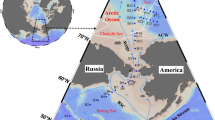Abstract
Taking advantage of the transfer of the Italian R/V “Italica” from Italy to New Zealand for the Italian Research Expedition in the Antarctic, surface sampling of plankton was carried out from 42°N to 43°S from 14 November to 16 December 2001. Collaboration between several Italian research groups resulted in the Mediterranean, Indian and Pacific Ocean Transect (MIPOT), aimed to merge oceanographic measurements with remotely sensed data and to study latitudinal changes in plankton communities. We present preliminary results on the tintinnids (abundance and species composition) along the MIPOT1 transect. Tintinnid distributions and food vacuole contents are discussed in relation to chlorophyll concentrations and contribution of phytoplankton size classes. Generally, chlorophyll concentrations were well below 0.5 mg m−3 and tintinnid numbers were only a few tens per liter. Eighty-six tintinnid species belonging to 27 genera were recorded. Highest diversity and number of tintinnid species occurred in the warm-water regions, from the Mediterranean Sea to the Tropic of Capricorn. Shannon diversity index ranged from 1.0 (Tasman Sea) up to 2.9 (tropical Indian Ocean). Each of the oceanic provinces showed a well defined tintinnid assemblage, a tintinnid ‘fingerprint’ characterizing each area. Data are compared to previous records for the different areas and the persistence in time of typical tintinnid species is discussed.
Similar content being viewed by others
References
Balech, E., 1959. Tintinnoinea del Mediterráneo. Trab. Inst. Esp. Ocean. 28: 1–88.
Balech, E., 1972. Los tintinnidos indicadores de afloramientos de aguas (Ciliata). Physis, Buenos Aires 31: 519–528.
Bernard, C. & F. Rassoulzadegan, 1993. The role of picoplankton (cyanobacteria and plastidic picoflagellates) in the diet of tintinnids. J. Plankton Res. 15: 361–373.
Brandt, K., 1907. Die Tintinnodeen der Plankton-Expedition. Systematischer Teil. Kiel und Liepzig: 1–488.
Burkill, P. H., R. J. G. Leakey, N. J. P. Owens & R.F.C. Mantoura, 1993. Synechococcus and its importance to the microbial foodweb of the northwestern Indian Ocean. Deep Sea Res. II 40: 773–782.
Capriulo, G. M., K. Gold & A. Okubo, 1982. Evolution of the lorica in tintinnids: a possible selective advantage. Ann. Inst. Océanogr. Paris 58(S): 319–324.
Cariou, J. B., J. R. Dolan & S. Dallot, 1999. A preliminary study of tintinnid diversity in the NW Mediterranean Sea. J. Plankton Res. 21: 1065–1075.
Chang, H. F., 1990. Quantitative distribution of microzooplankton offWestland, New Zealand. N.Z. J. mar. Freshwat. Res. 24: 187- 195.
Daday, E., 1887. Monographie der Familie der Tintinnodeen. Mitt. a d Zoolog. Station Neapel Bd VII: 473–591.
Dennett, M. R., D. A. Caron, S. A. Murzov, I. G. Polikarpov, N. A. Gavrilova, L. V. Georgieva & L. V. Kuzmenko, 1999. Abundance and biomass of nano-and microplankton during the 1995 Northeast Monsoon and Spring Intermonsoon in the Arabian Sea. Deep Sea Res. II 46: 1691–1717.
Dolan, J. R., 2000. Tintinnid ciliate diversity in the Mediterranean Sea: longitudinal patterns related to water column structure in late spring-early summer. Aquat. Microbiol. Ecol. 22: 69–78.
Dolan, J. R. & C. L. Gallegos, 2001. Estuarine diversity of tintinnids (planktonic ciliates). J. Plankton Res. 23: 1009–1027.
Dolan, J. R. & C. Marrasé, 1995. Planktonic ciliate distribution relative to a deep chlorophyll maximum: Catalan Sea, N. W. Mediterranean, June 1993. Deep Sea Res. I 42: 1965–1987.
Fenchel, T., G. F. Esteban & B. J. Finlay, 1997. Local versus global diversity of microorganisms: cryptic diversity of ciliated protozoa. Oikos 80: 220–225.
Halim, Y., 1969. Plankton of the Red Sea. Oceanogr. mar. biol. Ann. Rev. 7: 231–275.
Jörgensen, E., 1924. Mediterranean Tintinnidae. Rep Danish Oceanographical Expeditions 1908-1910 to the Mediterranean and adjacent seas II (J3): 1–110.
Kato, S. & A. Taniguchi, 1993. Tintinnid ciliates as indicator species of different water masses in the western North Pacific Polar Front. Fish. Oceanogr. 2: 166–174.
Kofoid, C. A. & A. S. Campbell, 1929. A conspectus of the marine and fresh-water ciliata belonging to the suborder Tintinnoinea, with descriptions of new species principally from the Agassiz expedition to the Eastern Tropical Pacific. 1904-1905. Univ. Calif. Publ. Zool. 34: 1–403.
Kofoid, C. A. & A. S. Campbell, 1939. The Ciliata: the Tintinnoinea. Bull. Mus. Comp. Zool. Harvard Coll. 84: 1–473.
Kršinić, F., 1988. The family Xystonellidae (Ciliophora, Tintinnina) in the Adriatic Sea. J. Plankton Res. 10: 413–429.
Laval-Peuto, M. & D. C. Brownlee, 1986. Identification and systematics of the tintinnina (Ciliophora): evaluation and suggestions for improvement. Ann. Inst. Océanogr. Paris 62: 69–84.
Leakey, R. J.G., P. H. Burkill & M. A. Sleigh, 1996. Planktonic ciliates in the northwestern Indian Ocean: their abundance and biomass in waters of contrasting productivity. J. Plankton Res. 18: 1063–1071.
Lynn, D. H. & D. J. S. Montagnes, 1991. Global production of heterotrophic marine planktonic ciliates. In Reid P. C., C. M. Turley & P. Burkill H. (eds), Protozoa and their Role in Marine Processes. NATO ASI Ser. G25 Springer Verlag, Berlin: 281–307.
Modigh, M. & S. Castaldo, 2002. Variability and persistence in tintinnid assemblages at a Mediterranean coastal site. Aquat. Microbiol. Ecol. 28: 299–311.
Naidu, D. W. & K. Krishnamurthy, 1985. Biogeographical distribution of tintinnids (Protozoa; Ciliata) from Porto Novo waters. Bull. Nat. Inst. Oceanogr. 18: 417–423.
Neveux, J. & M. Panouse, 1987. Spectrofluorometric determination of chlorophylls and phaeophytins. Archiv Hydrobiol. 109: 567- 581.
Paffenhöfer, G. A., 1998. Heterotrophic protozoa and small metazoa: feeding rates and prey consumer interactions. J. Plankton Res. 20: 121–133.
Pierce, R. W. & J. T. Turner, 1992. Ecology of planktonic ciliates in marine food webs. Rev. aquat. Sci. 6: 139–181.
Pierce, R. W. & J. T. Turner, 1993. Global biogeography of marine tintinnids. Mar. Ecol. Prog. Ser. 94: 11–26.
Pitta, P., A. Giannakourou & U. Christaki, 2001. Planktonic ciliates in the oligotrophic Mediterranean Sea: longitudinal trends of standing stocks, distributions and analysis of food vacuole content. Aquat. Microbiol. Ecol. 24: 297–311.
Rassoulzadegan, F., 1979. Évolution annuelle des Ciliés pélagiques en Méditerranée nord-occidentale. II. Ciliés Oligotriches. Tintinnides (Tintinnina). Inv. Pesq. 43: 417–448.
Rassoulzadegan, F., M. Laval-Peuto & R. W. Sheldon, 1988. Partitioning of the food ration of marine ciliates between pico-and nanoplankton. Hydrobiologia 159: 75–88.
Reckermann, M. & M. J. W. Veldhuis, 1997. Trophic interactions between picophytoplankton and micro-and nanozooplankton in the western Arabian Sea during the NE monsoon 1993. Aquat. Microbiol. Ecol. 12: 263–273.
Rohde, K., 1992. Latitudinal gradients in species diversity: the search for the primary cause. Oikos 65: 514–527.
Sherr, E. B., B. F. Sherr & G. A. Paffenhöfer, 1986. Phagotrophic protozoa as food for metazoans: a 'missing' trophic link in marine pelagic food webs? Mar. Microb. Food Webs 1: 61–80.
Spittler, P., 1973. Feeding experiments with tintinnids. Oikos 15: 128–132.
Srinivasan, A., R. Santhanam & G. Jegatheesan, 1988. Biomass and seasonal distribution of planktonic tintinnids of Pullavazhi Estuary, southeast coast of India. Ind. J. mar. Sci. 17: 131–133.
Stelfox, C. E., P. H. Burkill, E. S. Edwards, R. P. Harris & M. A. Sleigh, 1999. The structure of zooplankton communities, in the 2-2000 µm size range, in the Arabian Sea during and after the SW monsoon, 1994. Deep Sea Res. II 46: 815–842.
Stoecker, D. K. & N. K. Sanders, 1985. Differential grazing by Acartia tonsa on a dinoflagellate and a tintinnid. J. Plankton Res. 7: 85–100.
Sverdrup, H. U., M. W. Johnson & R. H. Fleming, 1942. The Oceans. Their Physics, Chemistry, and General Biology. Prentice-Hall, Inc. New York: 1087 pp.
Taniguchi, A. & Y. Hada, 1981. Eutintinnus haslae n. sp., a new ciliated protozoa from the Tropical Pacific and Indian Oceans. La mer 19: 18–22.
Thompson, G. A., V. A. Alder, D. Boltovskoy & F. Brandini, 1999. Abundance and biogeography of tintinnids (Ciliophora) and associated microzooplankton in the Southwestern Atlantic Ocean. J. Plankton Res. 21: 1265–1298.
Verity, P. G., 1987. Abundance, community composition, size distribution, and production rates of tintinnids in Narragansett Bay, Rhode Island. Estuar. coast. shelf Sci. 24: 671–690.
Verity, P. G., 1991. Measurement and simulation of prey uptake by marine planktonic ciliates fed plastidic and aplastidic nanoplankton. Limnol. Oceanogr. 36: 729–750.
Verity, P. G. & V. Smetacek, 1996. Organism life cycles, predation, and the structure of marine pelagic ecosystems. Mar. Ecol. Prog. Ser. 130: 277–293.
Wyrtki, K., 1973. Physical oceanography of the Indian Ocean. In Zeitzschel, B. (ed.), The Biology of the Indian Ocean. Ecological Studies 3, Springer Verlag, Berlin: 18–36.
Zeitzschel, B., 1969. Tintinnen des westlichen Arabischen Meeres, ihre Bedeutung als Indikatoren für Wasserkörper und Glied der Nahrungskette. Meteor Forschungsergeb. Reihe D 4: 47–101.
Zeitzschel, B., 1982. Zoogeography of pelagic marine protozoa. Ann. Inst. Océanogr. Paris 58(S): 91–116.
Author information
Authors and Affiliations
Rights and permissions
About this article
Cite this article
Modigh, M., Castaldo, S., Saggiomo, M. et al. Distribution of tintinnid species from 42° N to 43° S through the Indian Ocean. Hydrobiologia 503, 251–262 (2003). https://doi.org/10.1023/B:HYDR.0000008477.38383.d6
Issue Date:
DOI: https://doi.org/10.1023/B:HYDR.0000008477.38383.d6




